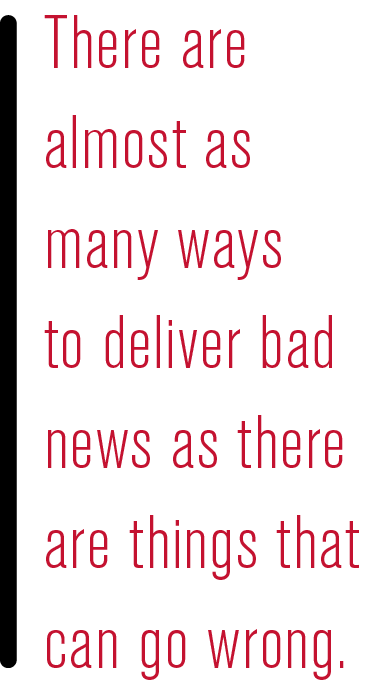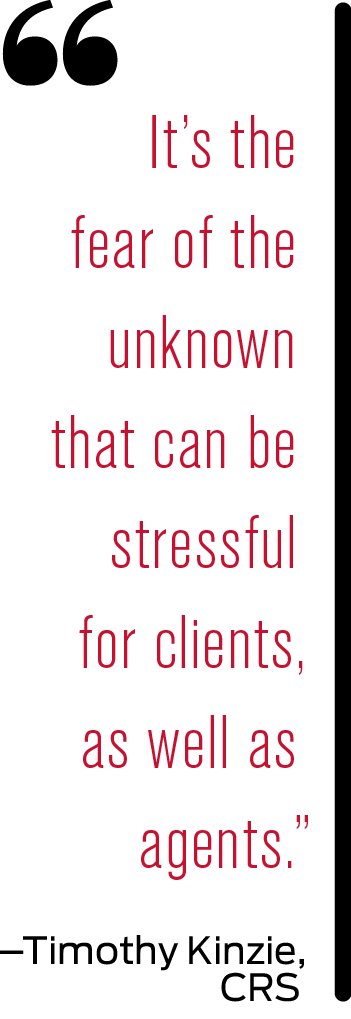Learn how to deliver disappointment in a calm and respectful manner
By Michelle Huffman
During her first real estate transaction, Janet Lay, CRS, encountered a major setback.
The buyers were purchasing a home with an FHA loan, but on a Friday afternoon, Lay learned that the property wouldn’t qualify.
The San Angelo, Texas-based REALTOR® stressed all weekend, stewing over how to deliver the bad news and her clients’ possible reactions.
When she finally told them on Monday, they shrugged it off, and the team agreed to move forward another way. It was a lesson she never forgot: Don’t stress when things go wrong—and don’t delay talking to your clients about it.
 In any real estate transaction, chances are something will go wrong. But delivering bad news to clients, especially big bad news like a sale falling through or thousands of dollars in unexpected repairs, is part of the job.
In any real estate transaction, chances are something will go wrong. But delivering bad news to clients, especially big bad news like a sale falling through or thousands of dollars in unexpected repairs, is part of the job.
How you handle the delivery and what you do from there is what matters, and it’s why buyers and sellers hire professionals, says CRS candidate Ileana Tavarez, a REALTOR® with Keller Williams in Austin, Texas.
“You definitely do not want to hire someone to sugarcoat the issues for you and put you in an even more unfavorable position later on,” she says. “You need someone that can be upfront with the issues but can also help you to navigate the different solutions you may not even be aware of.”
There are almost as many ways to deliver bad news as there are things that can go wrong, but several best practices can help guide you to the best bad news delivery.

Set up the possibility of challenges from the beginning
Many agents set expectations as early as possible that something may go wrong during the process, but that they’re more than capable of solving these problems.
“It falls on us to warn people that nothing is 100% in those first interviews,” says Gary Rogers, CRS, broker/owner of RE/MAX On The Charles in Waltham, Massachusetts. “Everybody wants to get the buyer or seller, so they don’t want to seem too negative. They end up acting like a cheerleader, but you can’t be the cheerleader and be 100% positive. You have to make sure they know sometimes something can go wrong, and if something does, that you have the experience to handle it.”
However, that tactic can backfire if something does go wrong, and the client is completely unprepared.
“It’s the fear of the unknown that can be stressful for clients, as well as agents,” says Timothy Kinzie, CRS, owner of Montlor Luxury Realty in Cary, North Carolina. “Human beings have the capacity to handle anything that they have been prepared to see coming. People tend to panic when they are confronted with challenges that were never part of the plan.”
Clients also need help characterizing the kinds of problems they may encounter.
“They rarely know how to differentiate between what’s catastrophic and what’s simply problematic, so we have to set the overall temperature,” Kinzie says. “The fact is we’re constantly dealing with challenges or unexpected issues, but the truly bad news, the kinds of things that jeopardize a deal, are actually quite rare.”
“You can’t sit on bad news”
“Delivering bad news is, without a doubt, the least favorite part of my career,” Tavarez says, but that doesn’t mean she will delay delivering it.
“Often, time is of the essence,” Lay adds. “They are not paying us to tell them what they want to hear. They’re paying us to help them accomplish a goal and do it as fast as possible.”
Ken Neufeld, CRS, a REALTOR® with London Properties Ltd in Fresno, California, likes to keep clients in the loop as much as possible, sharing that something may become an issue rather than waiting until it’s a full-blown problem.
“This helps with their emotional reaction,” Neufeld says. “The bad news isn’t hitting them like a ton of bricks. It’s hitting them like a slow-moving baseball.”
Do your research first, and come prepared with solutions
“When there is bad news and something’s gone wrong, before I pick up that phone, I want to research it as much as possible,” Rogers says. “The worst thing to do is say ‘I’ll get back to you.’ That just adds more stress.” Instead, be ready with options on how to handle it.
Neufeld tries to develop a range of possible solutions, starting from acceptable to ideal, so clients get a full idea of their options.
“I also make sure to be in a position where I have done everything in my power to resolve any issues before having to deliver bad news to my clients,” Tavarez adds.
Handling the actual conversation
Having the actual conversation with clients will require some tact, empathy and authority.
“You have to be a leader in this moment,” Kinzie says. “Come hell or high water, I’m going to continue doing everything in my power to help you secure the right home.”
Rogers, whose 20 years as a paramedic influence the way he delivers bad news, says that it’s important to deliver news in an even-handed, unemotional way. “Be empathetic, but business-like. I try to be as neutral as possible, with just a little bit of an uplift of hope.”
Silver-lining phrases like, “it wasn’t meant to be,” or “everything happens for a reason” can soften the blow sometimes, but Rogers cautions against relying on them. “Some clients like them, and some don’t,” he says. “You really have to know your client.”
Tavarez structures her conversation specifically using the “feedback sandwich method.”
“This is where you provide the bad news in between good news,” she says. “For example, I may start off with a positive update, deliver the bad news and potential solutions, and then end on a positive note, as well.”
Similarly, Neufeld feels that you can deliver bad news as instructive for future success. Perhaps clients who just lost a bidding war now know they’re willing to settle on one less bedroom, for example.
If you do it right, delivering bad news isn’t all that bad. Ultimately it can provide you as the agent with “the opportunity to strengthen the client relationship because you’ve gone through enough adversity to reinforce the relationship,” Kinzie says.
Text, Call or Face to Face: Where to Share Bad News
While adjusting your communication channels—text, email, phone call—to your clients’ preferred methods is usually sound advice, it’s not always relevant when delivering bad news. Agents say that text and email are unacceptable.
“Most bad-news conversations should be delivered over the phone because of the immediate nature of the communication,” Kinzie says. Making yourself available in these situations is the right thing to do. Rogers adds: “They need to hear your voice; they need to hear that you’re the professional.”
Neufeld and Lay take it a step further. If the news is bad enough—a deal fell through, a mortgage wasn’t approved, etc.—in-person or a video call is ideal.
CRSs and RRC members use the “We Are CRS” private Facebook group to solicit advice for problems, business solutions and more. Join the group today!
Photo: iStock.com/PeskyMonkey








